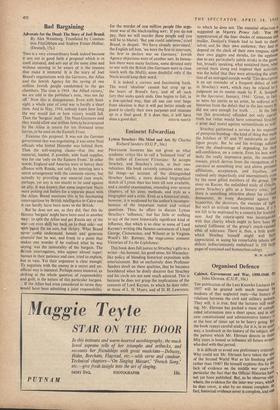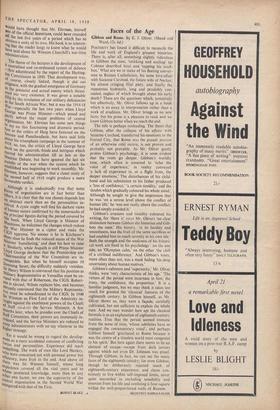Organised Defence
Cabinet, Government and War, 1890-1940. 01
THE publication of the Lees Knowles Lectures for 1957 will be greeted with much interest bf, students of that neglected topic—the history 01 relations between the civil and military power°. They will, it is true, find the lectures stiff read' ing. Mr. Ehrman has packed a mass of comPli" cated information into a short space, and in anY case constitutional and administrative history is at the best of times apt to be heavy going. 8°: the book repays careful study, for it is, in its quo' way, a landmark in the history of the subject, and the pattern which Mr. Ehrman detects in those fifty years is bound to influence all future writers who deal with that period.
It is difficult to avoid one preliminary criticism Why could not Mr. Ehrman have taken the end of the Second World War as his finishing point rather than 1940? He himself explains this by the lack of evidence on the middle war years--i° particular the fact that the Official Histories have not yet been published. But, as he observes else' where, the evidence for the inter-war years, which he does cover, is also by no means complete. 1° fact, historical evidence never is complete, and one THE SPECTATOR, APRIL 18, 1958 Would have thought that Mr. Ehrman, himself one of the official historians, could have rounded off the last five years of a period which has so obvious a unity of its own. His book is so interest- !IV that the reader longs to know what he would have said about Sir Winston Churchill's war-time administration.
The theme of the lectures is the development of a centralised and co-ordinated system of defence
first adumbrated by the report of the Harting- 1011 Commission in 1890. That development was, of course, closely linked, though it did not originate, with the gradual emergence of Germany as the potential and actual enemy which threat- ened our very existence. It was given a notable fillip by the revelation of our military deficiencies inthe South African War, but it was the 1914-18 Ivar—especially the last two years when Lloyd ueorge was Prime Minister—which posed and Partly solved the major problems of central terganisalion. Mr. Ehrman has some new things :21 saY on this fascinating and dramatic period. Just as the critics of Haig have fastened on the Somme and Passchendaele, but have said little about his triumphant campaign in the summer of 1918, so, too, the critics of Lloyd George have dwelt on the quarrels, feuds and intrigues which marred his administration till as late as the Maurice Debate, but have ignored the last six months of the war -when the system which he established was beginning to work smoothly. Mr. ,',irman, however, suggests that a closer study of the second half of 1918 might produce a more favourable verdict.
Although it is undoubtedly true that some '131-Ins of organisation are in fact better than others, it is clear that the one chosen depends less rta abstract merit than on the personalities in- volved. A cynic might well find his darkest views ?f human nature confirmed by the somersaults of 1,_he principal figures during the period covered by Lnis book. When Lloyd George is Minister of r1unitions, he welcomes the changes which reduce
„e War Minister to a cipher and make the
1GS svpreme. No sooner is he in Kitchener's noes than he finds the reduced status of the War vlinister 'humiliating,' and does his best to raise tit; Similarly, while Asquith is still Prime Minister 'l,_°Yd George declares that the Premiership and `-'llairmanship of the War Committee are in- e,cifripatible. But when he himself occupies 10 Downing Street, the difficulty suddenly vanishes. „ 'Llr Henry Wilson is convinced that his position as military Representative at Versailles must be co- equal with that of Robertson, the CIGS. Robert- 8011 is ejected; Wilson replaces him, and becomes. ,a,bruPtly convinced that the Military Representa- ,"'e must be subordinated to the C1GS. In 1940 Winston as First Lord of the Admiralty in- veighs against the exorbitant powers of the Chiefs of Staff vis-a-vis the Service Ministers. A few Iooths later, when he presides over the Chiefs of sn tliff Committee, their powers are immensely in- creased, and the Service Ministers are reduced to Tere administrators with no say whatever in the hh
Igher strategy.
Yet it would be wrong to regard the develop- ?tent as a mere accidental outcome of conflicting forces and personalities. Experience did teach something. The work of men like Lord Hankey, Who were concerned not with personal power but elneiency, bore fruit in the end. And above all there was Sir Winston himself, whose long 'experience covered all The vital years and to whose profound knowledge, more than to any °ther one factor, we owe the superiority of the central organisation in the Second World War compared with that of the First,
ROBERT BLARE





























 Previous page
Previous page